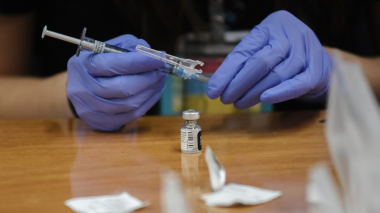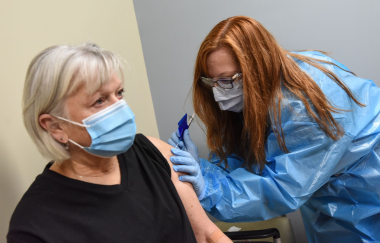As coronavirus disease (COVID-19) continues to affect our communities, Atrium Health has made it our top priority to ensure the safety of those who matter the most: You. As the conditions have evolved throughout the past few weeks, we have responded by implementing a number of new policies to ensure that patients are still able to safely receive the expert care they need while also protecting the health and safety of our teammates who continue to show up to work each and every day.
Using our COVID-Safe approach across all of our locations, Atrium Health is proud to stand as one of the first health systems in the region to expand delivery of care services with new safety protocols in place to ensure that our patients receive care in the safest environment possible. Learn about some of our new policies that we have set in place to keep patients, visitors and teammates safe and cared for.
(1) Face Masks for Everyone
One of the many ways we can reduce the spread of COVID-19 is to have everyone wear some kind of face mask. Our healthcare workers who provide direct patient care are wearing surgical masks or N95 respirators. We are asking that anyone else – patients, visitors and vendors – who enter our locations wear a mask of some kind. If you don’t have one, we will provide you one. This applies to everyone – except people for whom this causes respiratory distress and children under 2 who should not wear a mask because of suffocation risks.
You’ve probably also heard about the shortage of masks and other supplies for healthcare workers around the world. Keeping our teammates safe is the first step in keeping our patients safe. Thanks to the efforts of many – including donations from our community – Atrium Health’s teammates have the protection they need.
(2) Designated Patient Care Sites for Potentially COVID-19 Positive Patients
We have moved much of our care to virtual, offsite or in other ways established separate paths for those who may have COVID-19 to get care. For example, we have screening tents outside our emergency departments to help separate potential COVID-19 patients, we have testing centers at offsite locations, and whenever we can, we are grouping COVID-19 positive patients who need inpatient care together. We’ve also established a COVID-19 Virtual Hospital program that uses telemedicine to treat patients who don’t require the level of care such as in an Intensive Care Unit (ICU). This program helps protect the patient’s health and helps prevent further spread of the infection.
(3) Increased Cleaning Regimens
Few places do more cleaning than hospitals and other healthcare settings. Disinfecting is second nature to us, and part of our normal procedures. We have increased those efforts, and are wiping down surfaces in public areas with hospital-grade disinfecting wipes. Everything from elevator buttons to chairs in waiting areas and, of course, bathroom faucets and door handles are being disinfected every hour. Our cleaning process is now above and beyond what is recommended by the Centers for Disease Control (CDC).
You’ve also heard a lot about the importance of washing your hands. This is nothing new for healthcare workers – in fact the methods for how to effectively clean your hands are modeled after how surgeons and other healthcare workers stay germ-free. And, thanks to our supply team and the generosity of some local businesses, we have a good supply of hand sanitizer.
All of this adds up to make our locations some of the cleanest places around.
(4) Screening at the Front Door
If you come to us for care, you will notice things are a little different now. We will hand you a mask as you walk in, and we will take your temperature using a no-touch forehead thermometer. We will also ask you about any symptoms you may be experiencing. Nothing is more important to us than your safety, so we are taking these steps to catch anyone at the door who may need extra precautions. Our teammates – just like our patients, visitors and vendors – are also being screened at the start of every shift as they walk in the door.
(5) Operational Changes
Early on, we made changes to some of our basic operations. For example, we eliminated salad bars and similar self-service food stations in our cafeterias in favor of grab-and-go options. We have also stopped visiting our hospital patients to ask them about their food service. We typically like to ask our patients if they are happy with our food – we know good food is key to recovery – but, we have stopped doing that to reduce the number of people going in and out of hospital rooms. Similarly, our chaplains have found new ways to provide spiritual support while reducing the risk of spreading infection.
We have also implemented efforts to keep our distance from each other and our patients, as much as possible. If our staff does not have to provide hands-on-care, they will make an effort to stay 3 to 6 feet away from their patients.
Teams at Levine Cancer Institute and other areas have implemented staff rotation as one precaution. At LCI, they have implemented a two-team rotation, with people on 14 days and off 14 days.
Lastly, we dramatically reduced the number of visitors we allow at our locations. Just like social distancing in public, reducing the number of people coming into our facilities also reduces the potential for spreading infection.
(6) Additional Precautions
As we explore how we will start to resume normal operations, including non-essential surgeries and doctor’s visits, we are implementing new protocols to reduce risk. This includes things like screening, or if needed testing, for COVID-19 before invasive procedures, and helping patients keep appropriate distance from each other in waiting rooms.
We are also providing personal protective equipment to all our teammates, and we are taking the same level of precautions with every patient, whether we know if they are COVID-19 positive or not. Essentially, we are assuming everyone we come in contact with may have an infection, so that we can reduce the potential spread from people who are asymptomatic.
(7) Testing in Key Areas and Vulnerable Populations
One of the best ways to control the spread of infection is through testing. Testing allows us to know who is infected, and helps us more effectively control the spread. We are one of the few healthcare providers in the region with an in-house lab, allowing us to turn around test results in less than 24-hours.
But, testing is only useful if people are able to get to the testing site for their appointment. This is why we have launched a mobile testing unit, allowing us to use data to identify potential areas with higher rates of infection, and take testing capabilities right into those areas.
We identified early on that there would be key groups of people in our communities who might be more vulnerable than others. We have been diligently working with our partners in the community to make sure we are taking the right precautions and prepared to help our homeless, jailed and other vulnerable populations.
(8) Safe Emergency Departments
In addition to the adjustments made to screen patients before they enter our emergency departments, our emergency management teams are working continuously to ensure we have the most up-to-date information regarding COVID-19 identification, management and treatment.
If you come to one of our emergency departments, you will notice we are taking extra precautions to make sure any patient with COVID-19-like symptoms is properly screened and evaluated. This includes our heart attack and stroke patients, as sometimes those symptoms are similar.
We are reminding our communities that we are ready to care for them – especially for their emergency needs. It’s important to seek care immediately if experiencing the signs and symptoms of stroke, heart attack and other emergency situations.
For more, visit AtriumHealth.org/Safe



